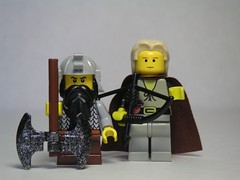 |
| Gimli and Legolas (Photo credit: Dunechaser) |
And, Gimli is obviously in agreement that the ring must be destroyed-- it could be because of the possibility of the elves getting hold of it, but he seems to accept that it has to be done for whatever reason, so he hops right up and tries to smash it with his battleaxe, which shatters on impact, leaving the ring undamaged, unlike Gimli himself, who seems to have been injured in the attempt. The most likely reason he joins the quest then, based on that evidence, is simply to destroy the ring, but he uses his anti-elf prejudice as a justification. This is ironic, since he has only the word of Elrond, the elf, that it must be done. Which leads me to wonder, what about Elrond? What are his expectations or hopes for this council? His behavior is sort of alien, in the non-human sense, or maybe it's just that he is a kind of king among elves and tries to stay above the rest of them. This idea is probably not going to find its way into my paper, but it's interesting anyway.


